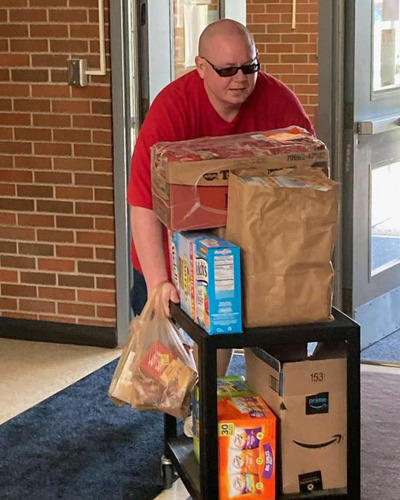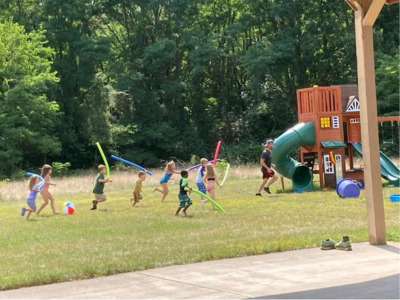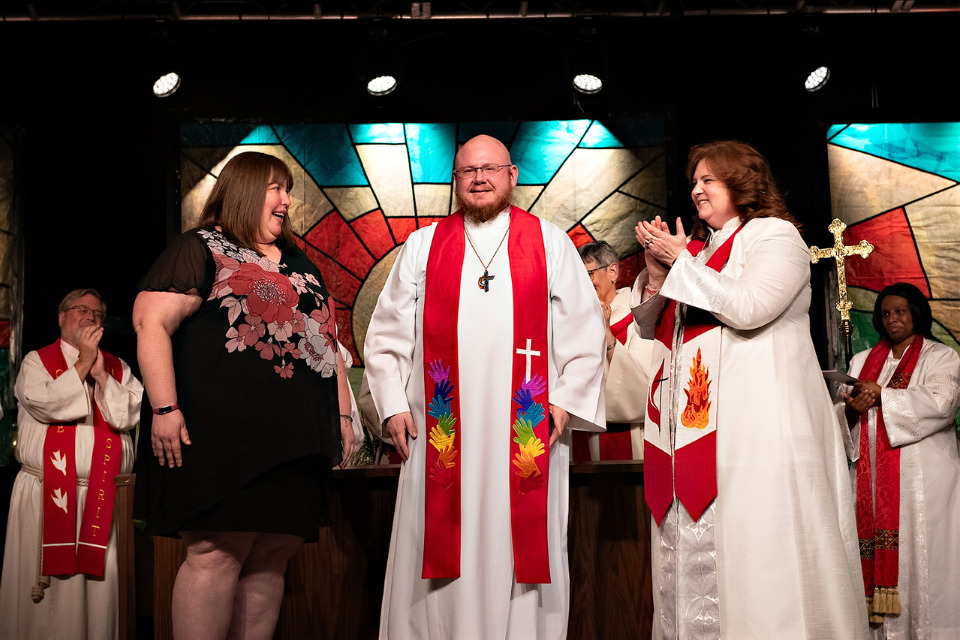Rev. Michael Vollmer continues our series of articles from our newest ordinands by reflecting on God’s persistent and patient call on his life and ministry.
REV. MICHAEL VOLLMER
Macon UMC and Stony Creek UMC
I felt a call to work in God’s ministry from an early age, but I never understood what I was experiencing. I just ignored it and focused on what most children do in their developmental years. I felt a strong pull again early in my professional career working in information technology. Still, I made excuses for why it was not a good time for that kind of transition, or I worried about the financial impact of such a change. So, I pushed it out of my mind and tried to bury it. But, just like managing grief, that tactic proved ineffective after some time. It wasn’t until I was married and working as the Executive Director of Information Technology at the College of Liberal Arts and Sciences at the University of Illinois — Chicago that I again felt that pulling and pushing toward pastoral ministry.

I had just experienced an incredibly trying day at work. Major transitions in the leadership and direction of the college were causing a great deal of stress for many people. I remember coming home and talking to my wife about how it was all affecting me and, without conscious thought, spitting out the words, “You know, it’s days like this I’d like to quit my job and become a pastor.” What happened next is somewhat in dispute, depending on who you ask. The way I remember it, she looked at me lovingly and encouragingly said, “So, why don’t you?” To hear her tell the story, her reply was filled with exhaustion and annoyance, but she still asked, “So, why don’t you?” That led to a lengthy discussion late into the night about what that kind of transition would look like, how it would affect our future, and so on. Ultimately, we both agreed that this was more than just a passing fancy, and we needed to begin figuring out what I would need to do to answer the call God had placed on my heart.
That night, I slept better than I had in months, and the following morning, I felt like a huge weight had been lifted off my shoulders. I took that as a sign that I was finally on the path, or at least heading that way, that God wanted for me. As we went along, every time something came up that could have been a serious roadblock or deterrent to moving forward to serving in pastoral ministry, low and behold, the situation would be rectified without incident. This was another sign that I was finally hearing and accepting God’s call and that maybe God was intervening to make the road more manageable and less frightening or stressful.
It took two interviews with the Board of Ordained Ministry before I was recommended for ordination and full membership as an Elder. Looking back, I was not ready the first time, and I completely agree with the decision the Board came to — not yet. I then took a few years to refocus on pastoral ministry in the local church. This time was invaluable, and what I learned played a significant part as I prepared to return for another interview with the Board.

God knew I needed more time to learn, grow, and fully understand the call God had placed on my heart. Part of that learning included better understanding the focus of my call. From the time I began seminary, I felt a deep movement toward reclaiming evangelism from the traumatic experience it had become for so many, back to sharing the Good News in loving ways. But during this time between interviews, I began to see more clearly where God wanted me to be active, which was helping to make the church a welcoming space for everyone and create opportunities for even our youngest people to be involved in worship and other activities. Growing up, I never felt like I mattered in the church or to the church, and now I never want anyone, especially children, ever to have that kind of experience. Our children and youth are not just the church’s future; they are also the present and should be invited to participate in the worship service beyond just the traditional “children’s sermon” time.
I am very grateful that the Board affirmed my growth as a spiritual leader who can bring positivity to the work of God’s ministry. And while the day-to-day work has not significantly changed since becoming ordained, I know there are additional expectations. Becoming ordained did not grant me any superpowers (at least not yet; I am still waiting to see), but it helped impress the importance and seriousness of our work even more. I feel a responsibility to the local church, the district, and the conference. As an ordained Elder, I will be looked to for leadership in whatever ways God calls and the Cabinet sees fit. And I look forward to all those opportunities to further our mission to make disciples of Jesus Christ for the transformation of the world.
Last Updated on November 14, 2023

